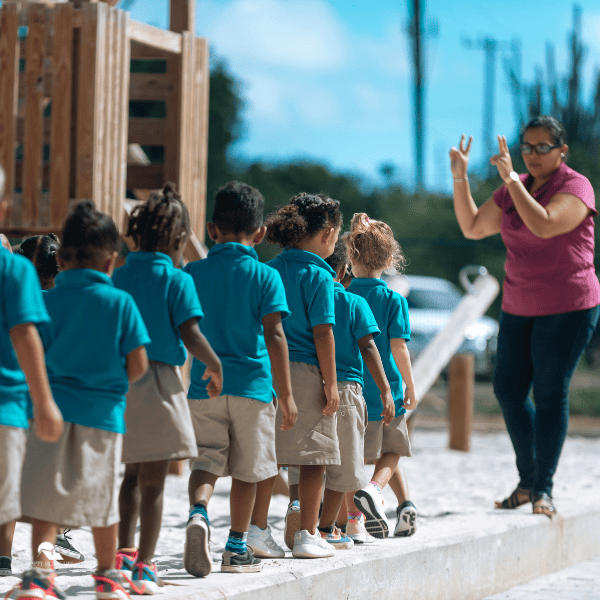It’s never too early to think about nurturing leadership skills in your preschool-age children, which are not only beneficial for their personal development at this tender age but also for their future success as teens and adults. While you may not be present in the classroom, it’s possible for you to collaborate with teachers and other parents to engineer events and environments that can bring out leadership qualities in your little one and other preschoolers.

To that end, here are some tips that you can employ to encourage and support your preschooler’s journey toward becoming a confident and capable leader:
1) Encourage Group Activities
Group activities are excellent avenues for preschoolers to practice leadership skills such as cooperation, communication, and decision-making. As a parent, you can encourage your little one’s participation in group activities both in and out of the classroom by organizing play dates, joining community events, or enrolling your child in extracurricular activities like sports teams or art classes.
An example would be if your child goes to Kinderland Singapore, a child care center known for its music-infused curriculum, where they’ll have plenty of opportunities to take part in music lessons with their classmates.
Through the Kinderland method, they’ll learn what it means to follow a leader and to step up as a leader when practicing a musical piece or executing a musical performance. To know more about how Kinderland trains young leaders through its music-centered program, you can see what parents have to say about Kinderland SG.
While group activities may present kids with challenges such as sharing and compromise, they also provide valuable opportunities to learn how to work with others towards a common goal. Encouraging your child to take on leadership roles within these groups—such as leading a game, organizing an activity, or stepping up for a music solo—can further enhance their leadership abilities and boost their confidence.
2) Carve Out Opportunities for Peer Collaboration
Preschoolers who are given the chance to collaborate with their peers can develop important leadership skills such as empathy, teamwork, and conflict resolution. You can facilitate peer collaboration activities with other parents by arranging play dates or more structured activities, like museum visits or sports games, with their children.
During such events, the children can practice sharing and taking turns or volunteering to fulfill certain roles. They can also find someone who can model positive social interactions for them.
Remember that it’s important to provide guidance and support to the group when conflicts arise. In these events, the intervention of an adult can help preschoolers navigate disagreements and find clear examples of mutually beneficial solutions to their issues.

3) Engage in Role-Playing
More than just a form of play, role-playing provides preschoolers with chances to explore different leadership roles and develop problem-solving and communication skills. It’s a type of activity that you can encourage at home by providing your child with props and costumes. You can also suggest scenarios for pretend play and participate actively in the role-playing process.
Through role-playing, young children can experiment with leadership roles such as being a teacher, doctor, or superhero. These make-believe scenarios allow them to practise essential skills like decision-making and delegation, as well as stoke their imagination and encourage them to think outside the box.
4) Provide Problem-Solving Activities
Problem-solving activities can aid preschoolers in developing critical thinking and decision-making skills, both of which are must-haves for leaders. Present your child with age-appropriate challenges or puzzles to solve, and push them to think creatively and explore different solutions.
It’s important to offer support and encouragement to your preschoolers as they tackle these challenges. In doing so, you’ll be able to emphasize the importance of perseverance and learning from one’s mistakes.
It’s also a good idea to incorporate problem-solving activities into everyday routines, such as when cooking together and building with blocks. These seemingly simple activities can do a lot to help preschooler consistently hone their leadership abilities.

5) Offer Decision-Making Opportunities
Do you provide your child with options? Giving preschoolers the chance to make decisions empowers them to take ownership of their choices and develop confidence in their leadership abilities.
You can involve preschoolers in decision-making processes by offering choices and encouraging them to express their preferences, be it in choosing what to wear, what to eat for snack, or what game to play.
Allowing preschoolers to make decisions helps them develop autonomy and assertiveness. It also fosters a sense of independence in them and teaches them to take responsibility for their actions.
6) Let Them Be Involved in Your Community
You can also participate in community activities as a family to provide your preschooler with a chance to see and practice leadership skills such as teamwork, communication, and empathy, all while making a positive impact on others.
Involving children in community service projects, such as charity events or neighborhood clean-ups, gives them a chance to observe leaders in action. Your family’s participation in the said activity also emphasises the importance of giving back and working together towards common goals.
7) Encourage Peer Mentoring
Pairing preschoolers with different skill levels or abilities allows them to learn from each other and develop leadership qualities such as empathy and patience. The parents in your child’s preschool class can encourage peer mentoring by arranging play dates or outings with older or younger children.
Aside from working with other parents in the class, you and your child can also join programs that pair children as mentors or buddies. These activities present a supporting and nurturing environment where preschoolers can internalize and practice leadership skills, which can help build their confidence and self-esteem.

8) Model Leadership Behaviours in Front of Your Child
Lastly, remember that you are a powerful role model for your preschooler. Your actions and behaviors greatly influence the development of your leadership skills. Modeling positive leadership behaviors such as communication, cooperation, empathy, and resilience can help you inspire your child and empower them to become a confident and capable leader.
Make an effort, then, to demonstrate leadership in everyday situations, such as by resolving conflicts peacefully, openly collaborating with others, and taking initiative to solve problems. What they learn at home from you can be of significant influence when it comes to the development of their own leadership style and values.
Nurturing leadership skills in preschoolers should be a collaborative effort between parents, teachers, and the broader community. Tips like the ones above should do a lot to empower young children, who will one day take their place as the leaders of the future.






